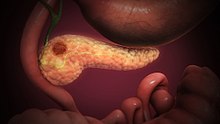
Pancreatic cancer is typically discovered only when it is advanced, very hard to treat, and typically with poor outcomes. Interesting recent research found that the gut microbiome is distinctive in persons with pancreatic cancer, even in the early stages. Perhaps this finding will lead to an easy noninvasive way to screen for pancreatic cancer.
Researchers in Spain and Germany looked at both the community of microbes (microbiome) living in the mouth and the gut (shown in a person's feces). They took samples from healthy persons, individuals with pancreatic cancer, and persons with chronic pancreatitis and found that the bacteria in the stool were predictive for pancreatic cancer (but not those in the mouth).
The "fecal microbiota signature" or pattern of microbes in those with pancreatic cancer had an increase in some microbes (e.g., Fusobacterium nucleatum) and a decrease in others (e.g., Faecalibacterium prausnitzii) - when compared to healthy individuals.
By the way, Fusobacterium nucleatum is found increased in other cancers, such as colon cancer, and beneficial and anti-inflammatory Faecalibacterium prausnitzii is reduced in a number of diseases. Eating a diet rich in high fiber foods (whole grains, fruits, vegetables, legumes, seeds, nuts) increase the numbers of F. prausnitzi in a person's gut microbial community.
From Medical Xpress: Distinct gut microbial profile may identify pancreatic cancer, irrespective of stage
A specific panel of gut microbes may identify pancreatic cancer, irrespective of how far the disease has progressed, suggests research published online in the journal Gut.
The findings offer hope of a new non-invasive method of diagnosing this hard-to-treat disease, which currently relies on invasive procedures to detect it, say the researchers.
Pancreatic cancer is the 12th most common cancer worldwide, but is set to become even more common over the next couple of decades. The most common form of the disease is pancreatic ductal adenocarcinoma for which the outlook is poor, with fewer than 1 in 20 of those affected surviving 5 or more years.
This is largely because diagnosis is often made when the disease is advanced and because of the absence of effective treatment options. Scans, tissue specimens, and urine and blood samples are used to diagnose it. But less invasive ways of picking it up, and at an early stage, are urgently needed, say the researchers.
Recent evidence suggests that changes in the microbiome—the trillions of bacteria, fungi, and other microbes that inhabit the digestive tract—may have a role in both its development and progression.
To explore this further, the researchers analyzed 100 spit and 212 stool samples and pancreatic tissue from 57 Spanish adults newly diagnosed with the ductal form and before treatment—25 with early stage disease and 32 with advanced disease; 50 healthy people matched for age and sex; and 29 people with chronic pancreatitis, a known risk factor for pancreatic cancer.
Gut microbes were more informative than mouth microbes. After accounting for known risk factors such as smoking, drinking, obesity and diabetes, a distinct microbial profile was observed in the stool samples of people with ductal pancreatic cancer compared with people with chronic pancreatitis and those without either disease.
Machine learning techniques identified a characteristic enrichment of certain species and a relative scarcity of others. Methanobrevibacter smithii, Fusobacterium nucleatum, Alloscardovia omnicolens, Veillonella atypica and Bacteroides finegoldii were abundant in the stool samples of the cancer patients while Faecalibacterium prausnitzii, Bacteroides coprocola, Bifidobacterium bifidum or Romboutsia timonensis were depleted.
This microbial profile consistently identified patients with the disease, irrespective of how far it had progressed suggesting that characteristic microbiome signatures emerge early on and that the stool microbiome might pick up early stage disease, say the researchers.
Accuracy increased still further to 0.94 when the microbial profile was combined with blood levels of carbohydrate antigen 19-9, a substance indicative of pancreatic cancer, but also various other conditions, and the only current non-invasive test, approved by the US drugs regulator, the Food and Drug Administration (FDA), for monitoring pancreatic cancer progression.
The predictive ability of the microbial profile was validated in a separate group of 76 German people, 44 of whom had pancreatic ductal cancer and 32 of whom didn't.
It was then validated against publicly available data from 25 studies involving 5792 samples covering 9 different health conditions, including other cancers and type-2 diabetes, a risk factor for pancreatic cancer.
The microbial profile of mouth, stool, and pancreatic tissue samples of patients with ductal pancreatic cancer were similar, suggesting that they may be closely linked.
